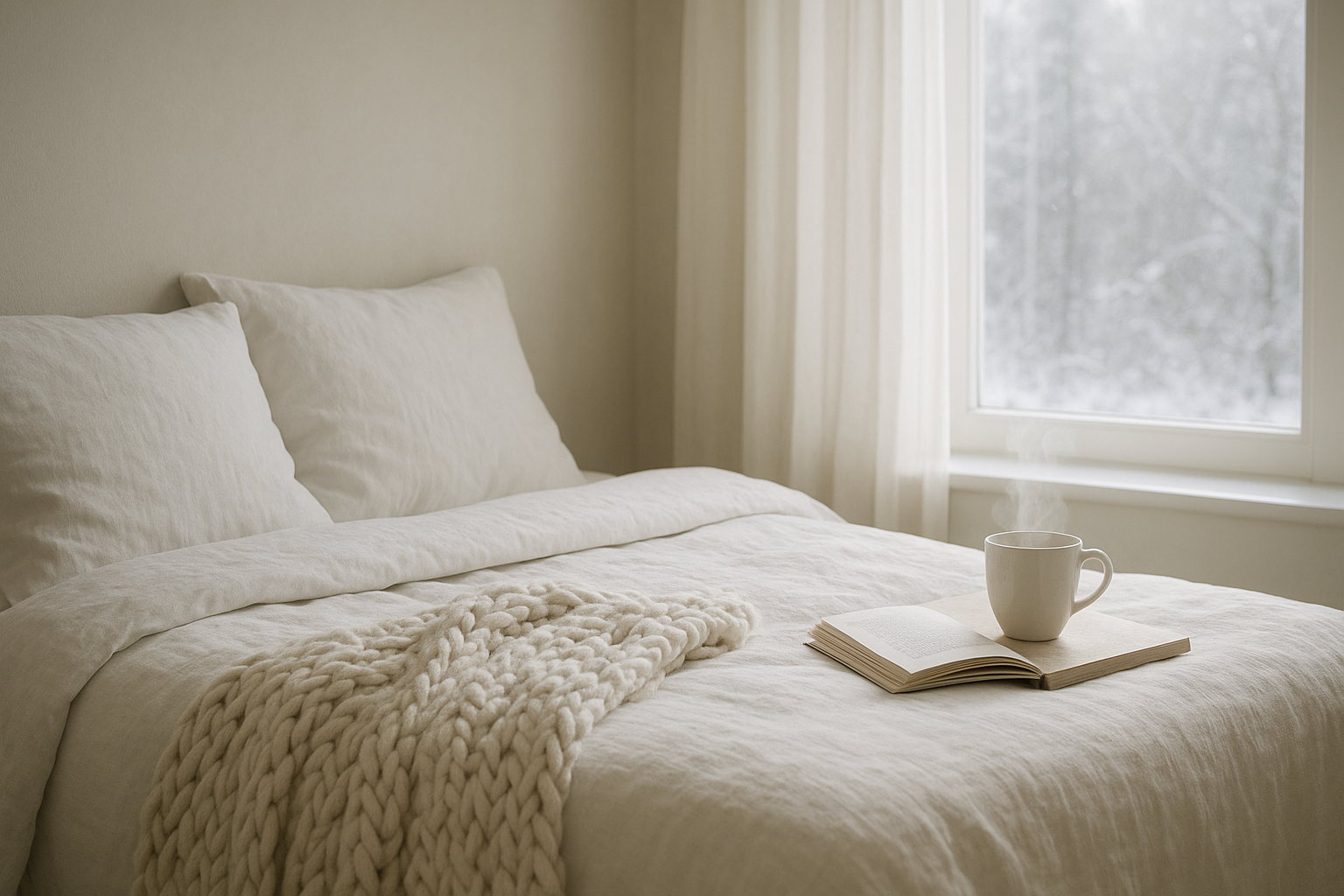When the temperature drops and the nights stretch longer, sleep should be your sanctuary, not a struggle.
But for many, winter brings restless nights: cold toes, dry air, and that heavy, groggy feeling that lingers well into the morning.
The truth is, staying warm isn’t just about piling on blankets. It’s about helping your body regulate temperature, breathe properly, and recover deeply so you wake feeling rested, not roasted.
Let’s explore how to design your winter sleep environment for comfort, warmth, and health.
1. Understand Your Sleep Temperature
Your body’s core temperature naturally drops at night to signal sleep.
But if your environment is too cold (below 16°C) or too warm (above 22°C), your sleep quality suffers.
The sweet spot? Around 18–20°C - cozy enough for comfort, cool enough for deep rest.
Layering natural, breathable materials lets your body self-regulate instead of overheating under synthetic fibers.
Pro tip: If you’re waking up sweaty or with dry skin, your room or bedding may be trapping heat and moisture - not supporting natural balance.
2. Choose Natural, Thermoregulating Bedding
Winter sleep isn’t about more blankets - it’s about smarter layers.
Natural fibres like Eucalyptus Silk (TENCEL™ Lyocell) and Bamboo excel here: they insulate when it’s cold, but release excess heat when your body warms up.
|
Fabric |
Key Benefit |
Ideal For |
|
Eucalyptus Silk |
Adaptive temperature control |
All-season sleepers, wellness seekers |
|
Bamboo |
Breathable yet warm |
Hot sleepers, allergy-prone |
|
Organic Cotton Satin |
Gentle, cozy feel |
Dry skin, self-care lovers |
|
Organic Cotton Percale |
Crisp & cool layering base |
Minimalists, combination sleepers |
Why it matters:
Synthetic fibres like polyester trap heat and moisture, which can disrupt your body’s sleep rhythm. Natural materials breathe with you - not against you.
3. Upgrade Your Winter Sleep Routine
Warmth isn’t only about your bedding - it’s about your habits.
Here’s how to prime your body for deeper, restorative winter rest:
-
Wind down warmly: Try a herbal tea or magnesium-rich cocoa 60 minutes before bed.
-
Preheat naturally: Use a hot-water bottle or heated wheat bag at your feet (skip electric blankets - they dry out skin and air).
-
Humidify the air: Dry winter air can irritate sinuses and skin. A small humidifier or a bowl of water near a heater helps.
-
Embrace ritual: Soft lighting, natural scents, and a slow wind-down routine signal your nervous system to rest.

4. Care for Your Bedding (and It’ll Care for You)
Fresh, clean bedding does more than feel good - it’s essential for winter health.
Warm, humid environments are ideal for dust mites and bacteria. Wash your bedding every 1–2 weeks, and let it air-dry fully.
Quick tip:
Our Eucalyptus Silk and Bamboo sheets dry up to 40% faster than cotton, so you can wash, dry, and reset your bed in a single winter afternoon.
The Verdict: Winter Warmth, the Ethical Way
You don’t need heavy layers or high heating bills to sleep well this winter.
You just need bedding that works with your body - regulating temperature, managing moisture, and nurturing skin.
Because real warmth isn’t about weight, it’s about balance.
And when your bedding helps you breathe, rest, and restore naturally, winter becomes less of a challenge and more of a comfort.
Sleep Deeply. Live Lightly.
Discover bedding that adapts to every season - sustainably made, naturally breathable, and impossibly soft.
Explore the full Ethical Bedding Collection →




Share:
The Secret to Silky Sleep: Why Satin Bedding Feels Like Everyday Luxury
What is a cooling pillow and how does it work?